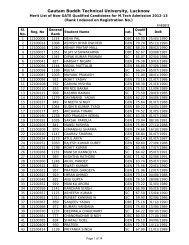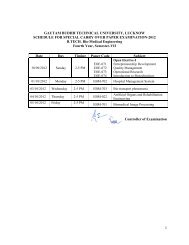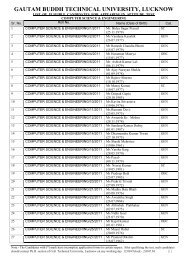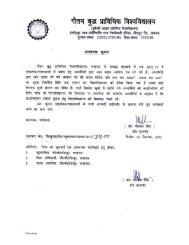NOTE MASTER OF BUSINESS ADMINISTRATION (MBA): The ...
NOTE MASTER OF BUSINESS ADMINISTRATION (MBA): The ...
NOTE MASTER OF BUSINESS ADMINISTRATION (MBA): The ...
You also want an ePaper? Increase the reach of your titles
YUMPU automatically turns print PDFs into web optimized ePapers that Google loves.
Unit V (12 Sessions)<br />
Organizational power and politics: Concept of power, sources of power, classification of power, contingency approaches to<br />
power. Political implications of power. Dynamics of power and politics.<br />
Organizational Conflict: Concept, Sources, types, functionality and dysfunctionality of conflict. Classification of conflict-intraindividual,<br />
inter-personal, inter-group, and organizational. Resolution of conflict, meaning and types of grievance and process<br />
of grievance handling.<br />
SUGGESTED READINGS:<br />
1) Davis, Keith -Human Behaviour at Works: Organizational Behaviour (Tata McGraw Hill, New Delhi.)<br />
2) Pareek, Udai- Behavioural Process in Organizations (Oxford and IBH, New Delhi.) 1981.<br />
3) Robbins, S.P - Organizational Behaviour ( Pearson Education, New Delhi.)<br />
10 th ed, 2003.<br />
4) Luthans, Fred,- Organizational Behaviour (McGraw Hill,) 1998, New Delhi.<br />
5) Green berg, “Behaviour in Organizations”, Pearson Publication<br />
6) Jit S. Chandan, “Organization Behaviour”, (Vikas Publishing House), 2004.<br />
<strong>MBA</strong> 113: LEGAL AND REGULATORY FRAMEWORK Max. Hours: 40<br />
Unit I (10 Sessions)<br />
Contract Act, 1872: definition, concept of contract, valid contract and its essential elements, criteria for classification for<br />
contract, quasi contract, various forms of quasi contracts, discharge of contract: various; remedies for breach of contract.<br />
Unit II (6 Sessions)<br />
Sale of Goods Act, 1930: introduction, contract of sale, agreement to sell, documents of title, conditions and warranties,<br />
doctrine of caveat emptor: transfer of property: significance of transfer of ownership, rules; performance: delivery of goods by<br />
seller, acceptance of delivery by buyer; remedies for breach: Rights of Unpaid-sellers<br />
Unit III (6 Sessions)<br />
Negotiable Instruments Act, 1881: definition and characteristics, promissory notes, bills of exchange, and cheques, parties to<br />
negotiable instruments; Methods of negotiation of instrument, endorsement and delivery of a negotiable instrument, negotiation<br />
by unauthorized parties, negotiation of dishonored and overdue instruments; banker and customer: introduction, crossing of a<br />
cheques, obligations of a banker, protection granted to bankers, obligations of a customer, bouncing of cheques<br />
Unit IV (10 Sessions)<br />
Partnership Act, 1932: definition of partnership, types, of partnership, Formation of Partnership, registration of partnerships,<br />
and kinds of partners, rights and liabilities of partners, minor’s status in a partnership firm, dissolution of partnership firm<br />
Companies Act, 1956: definition of a company, formation of company, memorandum and articles of associations of a company,<br />
types of companies, management of companies: directors and meetings; winding up of companies<br />
Unit V (8 Sessions)<br />
Consumer Protection Act, 1986: definition of consumer, goods and defect, services and deficiency, consumer forums,<br />
procedure to approach consumer forums<br />
Employee Benefit: brief outline of legislations: Minimum Wages Act, 1948; Payment of Bonus Act, 1965; Payment of Gratuity<br />
Act, 1972;<br />
SUGGESTED READINGS<br />
1) Kuchhal MC - Business Law (Vikas), 2 nd ed 1998.<br />
2) Tlsian- Business Law (Tata McGraw-Hill, 2 nd edition)<br />
3) Kuchhal- Mercantile Law (Vikas), 1998, 4 th ed.<br />
<strong>MBA</strong> 114: MANAGERIAL ECONOMICS Maxi. Hours: 40<br />
Unit I (4 Sessions)<br />
Overview: <strong>The</strong> economics background to management; Nature and scope of managerial economics and its relationship with<br />
other disciplines; Significance in decision-making and five fundamental concepts<br />
Unit II (8 Sessions)<br />
Demand analysis: Demand theory; Objectives of demand analysis and determinants of demand; Elasticity of demand and its<br />
measurement methods; Importance in decision-making; Demand forecasting methods<br />
Unit III (10 Sessions)<br />
Production and cost analysis: Production concepts and analysis; Production function; Characteristic of various factors of<br />
production; Laws of production; Cost concepts and analysis; Empirical estimates of production and costs; Production function<br />
and its managerial use, short-run and Long-run Average costs curves and its analysis.<br />
Unit IV (10 Sessions)<br />
Pricing decisions: Pricing under different market structure: perfect and imperfect (monopoly, monopolistic and oligopoly<br />
markets). Pricing strategies; Collusive and non-collusive oligopoly; Baumol and Marris’s models<br />
Unit V (8 Sessions)<br />
3


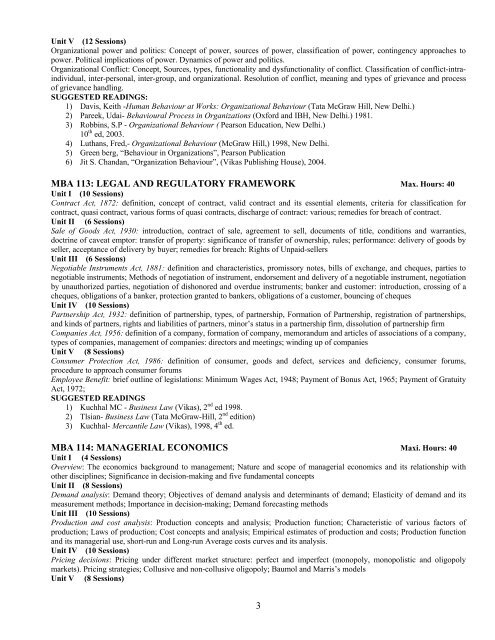
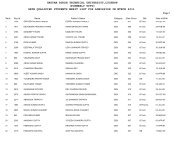
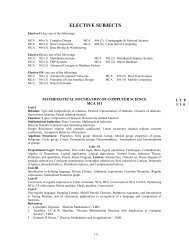

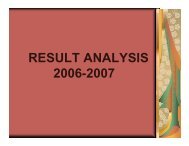

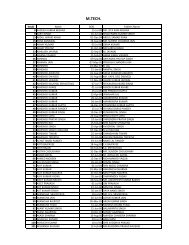
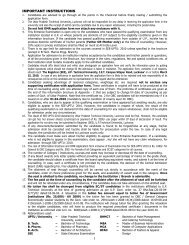
![[MODEL QUESTION PAPER] B-Tech FIRST SEMESTER ...](https://img.yumpu.com/47613205/1/190x245/model-question-paper-b-tech-first-semester-.jpg?quality=85)

